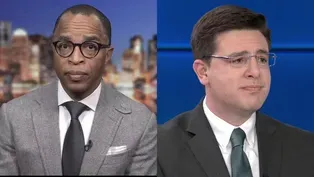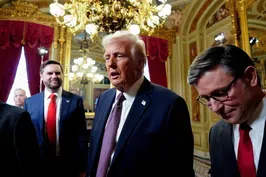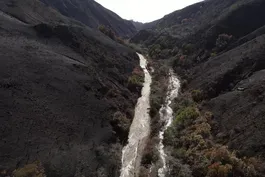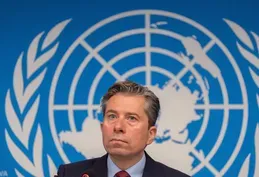
Chicago Fed president on the new jobs report and economy
Clip: 2/7/2025 | 6m 37sVideo has Closed Captions
Chicago Fed president on what the new jobs report says about the economy
The new jobs report shows the pace of hiring slowed slightly in January with the economy adding 143,000 jobs. The report also revised down jobs numbers between April 2023 and March of 2024 by nearly 600,000, the largest annual revision in more than 15 years. To help make sense of it all, Amna Nawaz spoke with Austan Goolsbee, president and CEO of the Federal Reserve Bank of Chicago.
Major corporate funding for the PBS News Hour is provided by BDO, BNSF, Consumer Cellular, American Cruise Lines, and Raymond James. Funding for the PBS NewsHour Weekend is provided by...

Chicago Fed president on the new jobs report and economy
Clip: 2/7/2025 | 6m 37sVideo has Closed Captions
The new jobs report shows the pace of hiring slowed slightly in January with the economy adding 143,000 jobs. The report also revised down jobs numbers between April 2023 and March of 2024 by nearly 600,000, the largest annual revision in more than 15 years. To help make sense of it all, Amna Nawaz spoke with Austan Goolsbee, president and CEO of the Federal Reserve Bank of Chicago.
How to Watch PBS News Hour
PBS News Hour is available to stream on pbs.org and the free PBS App, available on iPhone, Apple TV, Android TV, Android smartphones, Amazon Fire TV, Amazon Fire Tablet, Roku, Samsung Smart TV, and Vizio.
Providing Support for PBS.org
Learn Moreabout PBS online sponsorshipAMNA NAWAZ: Today's jobs report not only showed the pace of hiring slowed slightly in January, adding 143,000 jobs.
It also revised down jobs numbers between April of 2023 and March of 2024 by nearly 600,000, the largest annual revision in 15 years.
To help us make sense of all of this, we're joined now by Austan Goolsbee, president and CEO of the Federal Reserve Bank of Chicago.
Austan, welcome back to the "News Hour."
Good to see you.
AUSTAN GOOLSBEE, President, Federal Reserve Bank of Chicago: Yes, thank you for having me.
AMNA NAWAZ: So let's start with today's numbers, shall we, 143,000 jobs added, a bit lower than expected.
We also saw unemployment tick down to 4 percent.
Wages also rose 4.1 percent from the prior year.
What do all these numbers put together say to you about where we are?
AUSTAN GOOLSBEE: Yes, there's a lot of numbers, and you always want to be careful overindexing on one month.
Remember that the payroll jobs created number is plus-or-minus around 100,000.
So it was 150,000-plus or minus-100,000.
I think most measures of the job market have been pretty solid, and they're largely saying the economy's kind of settled in at something like full employment.
Always, in January, you have these big revisions and this was the biggest revision in some time looking back on the previous year.
But we have had a lot of variability.
Just the last month's number got revised way up.
So we're just going to have to look for the through line and not overreact to any one month.
AMNA NAWAZ: And that big revision down, though, there are some technical reasons here as well.
But does it overall in any way say to you that maybe the economy's actually been growing much more slowly than we'd previously thought?
AUSTAN GOOLSBEE: I don't think so, because, as I said, we have a lot of measures of the job market, the unemployment rate, the number of jobs.
We can look at the ratio of how many job vacancies there are to how many unemployed workers there are, hiring rates, quit rates, are there layoffs.
And by taking the totality of those measures, it looks to pretty much looks to be a kind of a stable arrangement.
That said, I do think we had an experience over the year, because this recovery has been so much different coming out of COVID than in previous recoveries, a lot of the adjustments that the Bureau of Labor Statistics has to do to the -- to when it comes up with the numbers.
As they got the real data, they led to bigger revisions than we normally have.
AMNA NAWAZ: So let's talk about what all this could mean for the future.
Obviously, you and your colleagues at the Fed watch all of this very closely.
You are a voting member this year.
We have seen inflation trending down.
It hasn't quite hit that 2 percent target we know the Fed wants to see.
And the next decision, we believe, on interest rate cuts could be on March 19.
So, as of today, where are you on the possibility of a rate cut?
AUSTAN GOOLSBEE: Well, I have been saying -- I said in the summer that I thought where we were going to end up in the relatively near future, let's call it one to one-and-a-half years, was, the rates would come down, because the economy was looking pretty solid.
The job market had settled in about where we thought it would settle, that inflation was coming down to 2 percent.
And we then cut a full percentage point off of rates.
And now, if we slow the pace of how fast the rates cuts come, that would make sense to me, because we're getting closer to the stopping point.
But I still think that if you take the through line and we can get around some of these policy uncertainties, I still think we're over the next year to year-and-a-half that rates be trending down.
AMNA NAWAZ: But you're saying slowing on the pace of those, so likely no rate cut ahead on the next decision day?
AUSTAN GOOLSBEE: Yes, I don't like tying our hands, when we have still got a lot of information to get before the next meeting.
But, at the last meeting, I said it makes sense to me, as we're getting to this spot where we need to figure out and feel our way toward what in our language we call neutral, we're going to feel our way to neutral, it makes sense to slow down how rapidly you're doing that, because monetary policy's impact on the economy comes with a lag.
It doesn't all just happen instantaneously.
So you can't just jam it and then hope it's right.
AMNA NAWAZ: You mentioned some of the uncertainty ahead.
I have got a little over a minute left here, but I want to get your take on this, because there's a lot of new proposals and new policies we have seen from this administration on things that could impact the work force or trade in dramatic ways, when you look at deportations ramping up, immigration crackdown, potential tariffs on major trading partners.
How are you looking at those?
And do you see any of those as potentially inflationary?
AUSTAN GOOLSBEE: Yes, some of those are -- could clearly be inflationary.
You have got others, deregulations, we have had a high productivity growth rate, some of them that would be disinflationary.
I kind of have -- my view has been, we want to get a through line, and this is adding a kind of dust in the air and making it harder to see.
So I think, unless we get to and at the point where we get to resolving some of these policy uncertainties that might muddy our index of, if you see inflation progress stalling or even going back up, is that because the economy is overheating, in which case the Fed would be primed to act, or is that because of some of these policy things that might just be temporary?
That's going to be a tough spot for the Fed to try to disentangle.
And so that just emphasizes slowing down the pace at which it's going even more.
AMNA NAWAZ: Austan Goolsbee, president and CEO of the Federal Reserve Bank of Chicago, thank you so much.
Good to speak with you.
AUSTAN GOOLSBEE: Yes, great to see you again.
A Brief But Spectacular take on making each day opening day
Video has Closed Captions
Lawrence Chu's Brief But Spectacular take on treating each day like a grand opening (3m 50s)
Capehart and Continetti on Trump's executive power
Video has Closed Captions
Capehart and Continetti on Trump pushing the limits of executive power (10m 53s)
Congress struggles to keep up as Trump reshapes government
Video has Closed Captions
Courts and Congress struggle to keep up with Trump as he reshapes American government (8m 19s)
Displaced Gazans return to face uncertain future
Video has Closed Captions
Displaced Gazans return to face shattered homeland and uncertain future (3m 32s)
The growing concerns around the boom in sport betting
Video has Closed Captions
The growing concerns around the boom in sport betting (8m 31s)
News Wrap: Heavy rains in California trigger landslides
Video has Closed Captions
News Wrap: Heavy rains in California trigger landslides (4m 59s)
Top UN humanitarian official on the situation in Gaza
Video has Closed Captions
Top UN humanitarian official describes the current situation in Gaza (5m 12s)
Providing Support for PBS.org
Learn Moreabout PBS online sponsorshipMajor corporate funding for the PBS News Hour is provided by BDO, BNSF, Consumer Cellular, American Cruise Lines, and Raymond James. Funding for the PBS NewsHour Weekend is provided by...



















